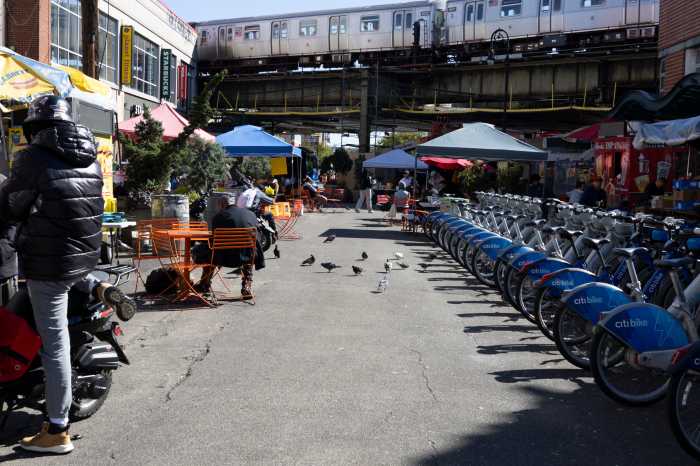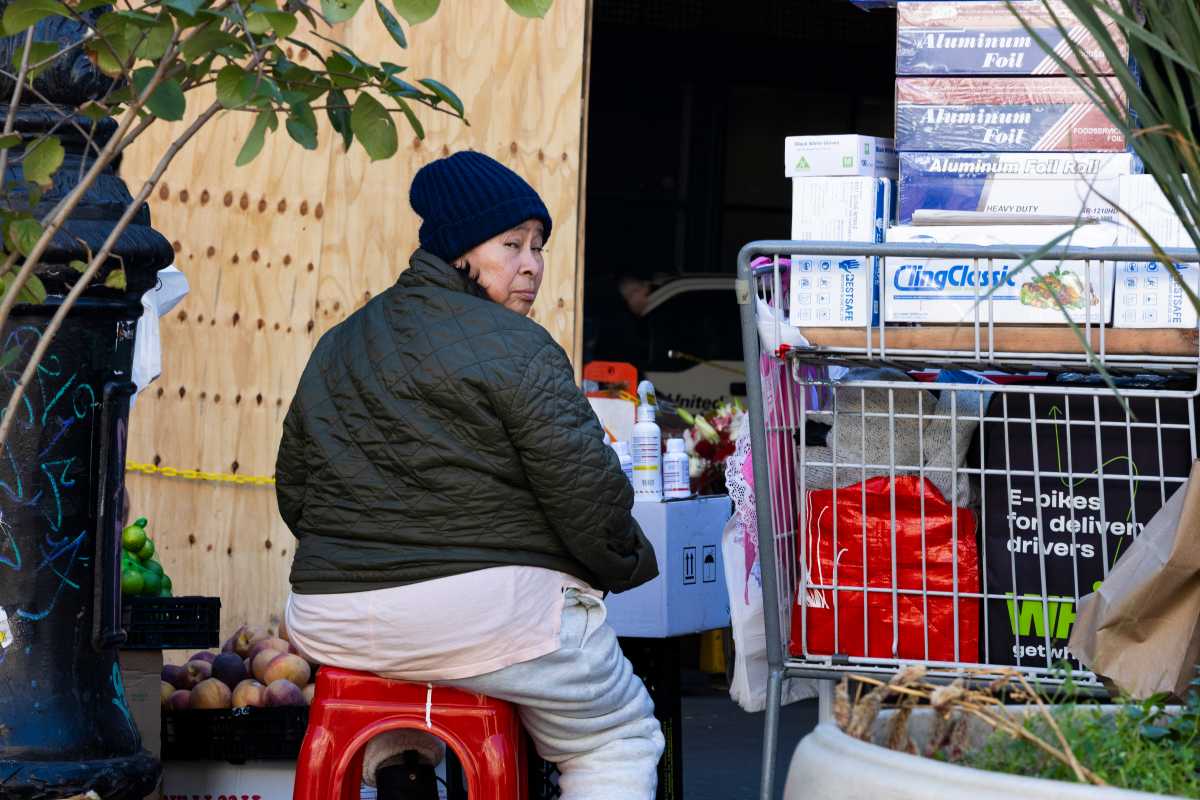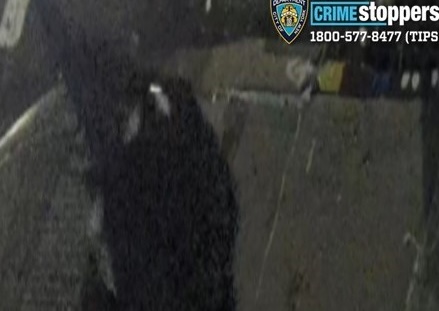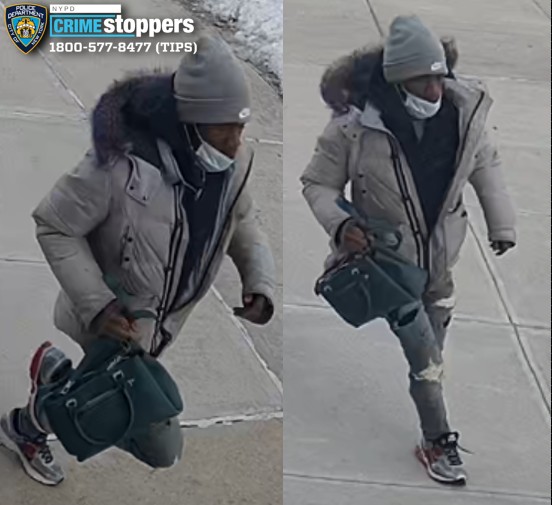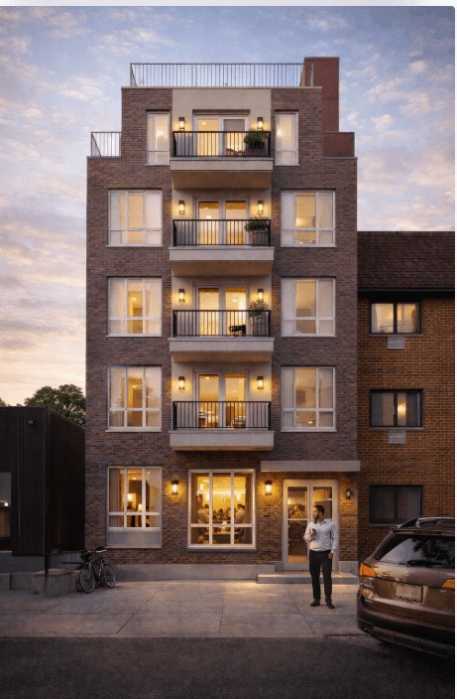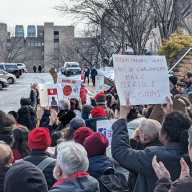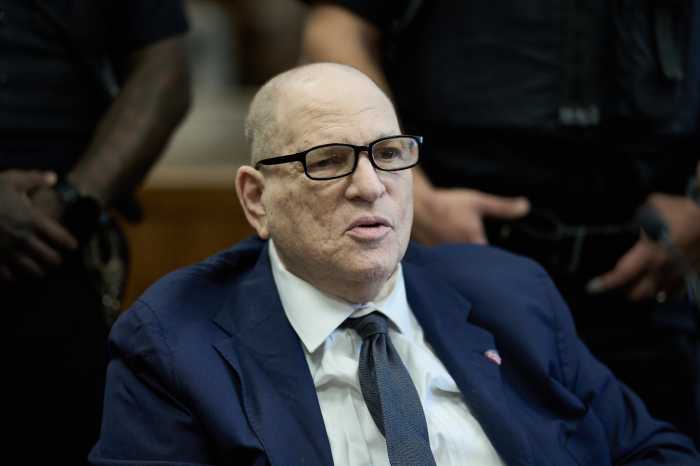Both Ridgewood residents and legal street vendors have recently filed complaints to the city’s Department of Sanitation (DSNY) claiming that the growing number of illegal street vendors at the Myrtle Wykoff Plaza has become “out of control.” The plaza, first built in 2016, covers the block just outside of the Myrtle Wyckoff subway station and sees major pedestrian traffic every day. As a result, it’s become an “open air marketplace” for illegal and legal vendors selling all types of wares.
The plaza also is home to a busy Citi Bike station, as well as several chain businesses like Starbucks, meaning delivery drivers sit and await orders on their scooters. When exiting the station, street vendors can be seen lining every sidewalk selling food, fruit, jewelry and common household items.
However, according to one vendor who spoke to QNS on the condition of anonymity, a majority of them are unlicensed businesses.
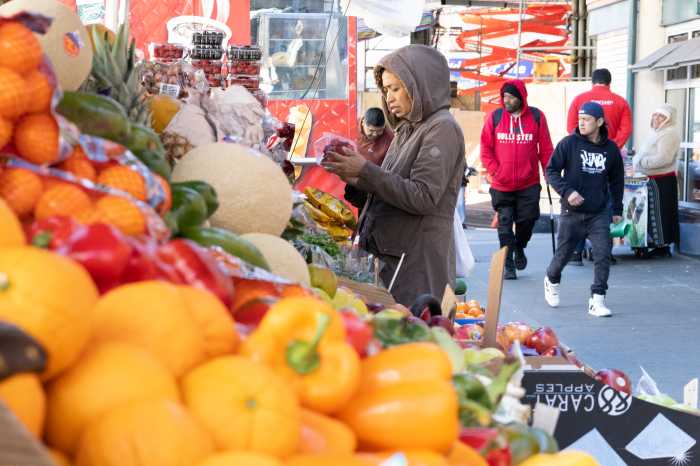
“They all work for their families, but they need to be legal,” said one of the licensed fruit stand’s employees. “I call DSNY every week, and they don’t come. Maybe once every three months.”
According to the employee, only four or five of the vendors within the plaza have licenses, which is less than a third of the vendors that can be seen lining the street and surrounding blocks. Many of the illegal vendors’ stands violate basic rules and regulations.
The general street vendor licenses are given out by the Department of Consumer and Worker Protection (DCWP), but food vendors require additional licensure from the Department of Health and Mental Hygiene (DOHMH).
‘The situation is out of control’
Some of the visible violations of the Myrtle Wyckoff vendors can be seen as you walk past. Vendors that sell food are not permitted to have seating around them. Goods cannot be placed on the sidewalk, even with cardboard, and horizontal displays need to be at least two feet off the ground, and cannot be longer than eight feet along the sidewalk and three feet deep. Street vendors are not allowed within 20 feet of the entrance or exit of any building for emergency response purposes. And vendors are only allowed on sidewalks that have a twelve foot wide path to ensure accessibility, leading to the cramped sidewalks of the plaza.
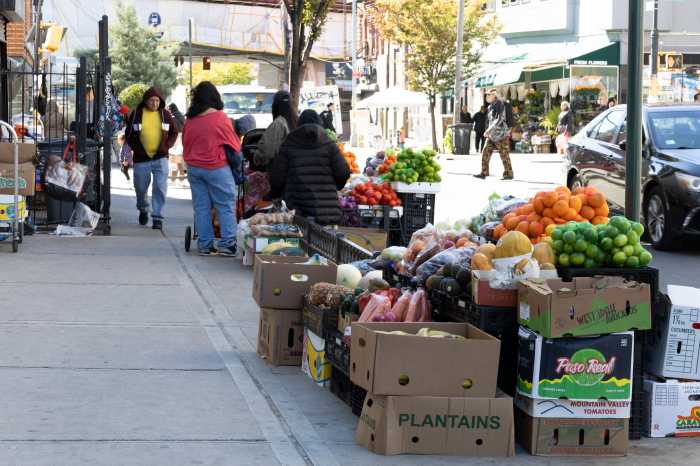
Gary Giordano, district manager of Queens Community Board 5, says the biggest concern is all of the garbage that gets left behind and poses a health risk to nearby residents and the businesses in the plaza. Despite the recent changes to New York’s trash laws requiring that all waste left on the sidewalk must be placed in containers, trash bags can be seen propped up beside the few public bins surrounding the plaza.
“The attraction of rodents is bad,” Giordano said. “And of course, there are licensed merchants that are paying the taxes. I can understand how someone would want to vend if they didn’t have another source of income, but that’s a very confined environment.”
According to an anonymous licensed vendor, the illegal stands set up tables and chairs for their customers to eat, resulting in litter and fallen food scraps that attract rats. The extra space taken up also makes operating their business difficult, forcing them to squeeze by the seating placed around them. The additional noise makes it difficult to hear customers, especially when the illegal vendors stay until early morning, playing loud music.
“The situation is out of control, especially on the weekends,” they said. “You can barely walk here and with all the screaming and the yelling… sometimes it feels like I’m in some sort of fish market.”
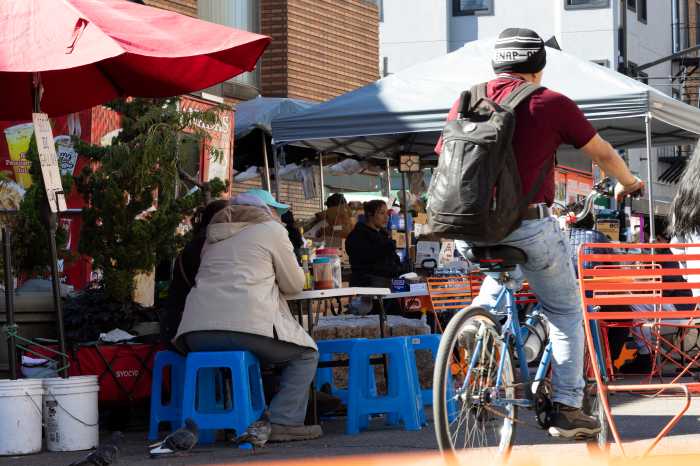
Street vendor enforcement
While speculating on why the vendors don’t get their permits, the owner said the blame lies with both the vendors and the city.
“It’s half and half,” they said.
The typical food vendor license costs $200 and must be renewed every two years, and requires the business owner to take basic food safety training that goes over temperature requirements, contamination, etc. Requiring food vendors purchase a push-cart or food truck to serve food is a financial barrier for many, and aspiring vendors who cannot afford one will be denied if they cannot afford one within six months after their applications are processed. However, street vendor licenses have never been more accessible.
In 2021, the City Council passed Intro. 1116-B and began giving out an extra 400 licenses per year for a period of 10 years to increase the cap across every borough by 4,000: doubling the figure of permitted street vendors. These supervisory licenses are more expensive, costing $500 annually, and require the licensee to be on the premises at all times, in order to curb illegal license-renting.
The bill also officially created a street vending enforcement unit within DSNY and created the Street Vendor Advisory Board, which includes representatives of street vendors, members of non-profits like the Street Vendors Project, and the commissioners or designees of several city agencies (consumer and worker protection, health and mental hygiene, small business services, transportation, and police). The review panel gives out recommendations to be enforced for specific geographic locations, such as a rule prohibiting vendors outside of the World Trade Center or in downtown Flushing, during specific times of the year. However, the panel has never made a regulation for an area like the Myrtle Wyckoff Plaza before.
The history of street vendor enforcement has been fraught and complicated. Before Intro. 1116-B, the responsibility laid with the Office of Street Vendor Enforcement within the Department of Worker of Consumer and Worker Protection (DCWP) at the behest of then Mayor Bill DiBlasio. However, DCWP Commissioner Vilda Vera Mayuga alerted the City Council that her department was not the right fit for enforcement.
“We are not the right agency equipped with the right knowledge to enforce street vending,” Mayuga said at the time.
After Mayuga’s comments in 2023, Mayor Eric Adams passed the responsibility to DSNY, officially establishing the enforcement unit within the department. Before the DCWP’s brief stint enforcing street vendor regulations, the NYPD worked with the DOHMH and the Department of Parks and Recreation to enforce the permits. According to one of the vendors at Myrtle Wyckoff, who’s been operating in the area for over a decade, enforcement before the responsibility changed hands twice was far more effective with much faster response times to complaints.
“The city is just trying to do their jobs… they don’t come to give me a ticket, they come to make sure my customers are safe,” the owner said.
As of September this year, street vendor permit violations are no longer considered misdemeanor crimes, and have been relegated to civil penalties or fines, after Intro. 47-B passed with a 40-7 majority in the City Council.
“Making it a civil penalty will essentially encourage more and more people to break the law… and when they sell food, that’s particularly disturbing because it could affect public health,” said Council Member Robert Holden after the bill passed.
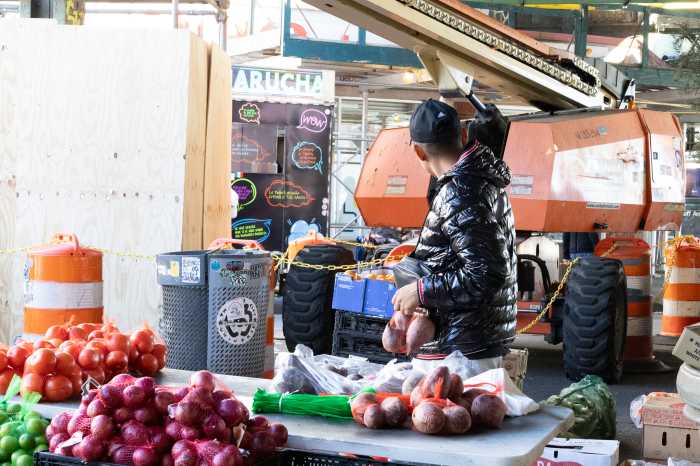
According to a DSNY representative, operations to crack down on illegal street vending in the area have persisted throughout this year. Since July of 2024, DSNY conducted 59 inspections resulting in 49 confiscations, and 26 official summonses. On average, that’s around five inspections per month. Food confiscated is either composted or donated to food pantries, with a total of 26,000 pounds, just from the Myrtle Wyckoff Plaza, within the last year.
“Our enforcement work is rooted in the belief that all New Yorkers, across every neighborhood, in every borough, deserve clean, safe sidewalks,” said the representative. “We enforce street vending laws with a focus on situations where vending has created dirty conditions, safety issues, items being left out overnight, and setups that block curbs, subway entrances, bus stops, sidewalks or store entrances.”
Vendors in the plaza don’t believe it to be enough, and claim that the illegal vendors simply return “an hour” or so after government officials leave, accepting the loss of their confiscated goods and resuming operation the very same day. However, some Ridgewood residents don’t mind the overcrowding and enjoy the sense of community the busy plaza presents.
“When they made this plaza, the whole goal was to try and help this area gentrify. Most of these people have been living here all their lives,” said Adam Alexander, born and raised in Ridgewood. “Everyone is nice… and it’s New York City, everywhere is crowded. When I grew up here, you didn’t want to be in this area. I like it, every time I come I try to make some more time just to be here.”
The licensed vendors requested to remain anonymous for fear of retaliation from the illegal vendors operating next to them. The anonymous vendor is sympathetic to their needs to feed their families, and worries about potential raids by Immigration and Customs Enforcement (ICE) looking for illegal immigrants, because earlier this week, those fears became all to real.
On the afternoon of Oct. 21, federal agents conducted a raid in downtown Manhattan on Canal Street targeting “counterfeit” vendors. Onlookers report that the Chinatown street vendors began packing their things and fleeing, before agents chased them down and detained several vendors to request passports or other proof of legal status. ICE arrested dozens of vendors, as well as several protesters after an agitated crowd of New Yorkers had formed around the agents.
“How are we going to protect people with our little place?” Giordano said when asked how to protect the vendors in Queens from similar raids. “I’m worried wherever it happens, it’s just been mean spirited, sown a lot of dissention among immigrant people, and it’s a power play. A lot of them are true asylum seekers who deserve their day in court.”
The immigration status of many of the vendors at the Myrtle Wyckoff plaza is unknown, as the application requires a form of valid id that can be from any country and proof of residency, and is thus not proof of legal immigration status. But the anonymous street vendor, a legal immigrant, only carries their vendor license to show DSNY officials during inspections. However, they stated the fear that ICE could come to Queens next is reason enough to bring their U.S. passport with them. But they still fear for employees and other vendors who are still awaiting their court dates to receive their documentation.
“It’s stupid. How are you going to work on your cart with your passport?” they said. “They’re arresting those even going through the process. Knowing all this, we’re scared.”
